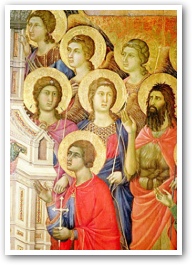Saints Crispin and Crispinian
- FATHER GEORGE W. RUTLER
Of Saints Crispin and Crispinian, Shakespeare put their names on the lips of the 29-year-old King Henry V rallying his outnumbered troops at Agincourt.
 |
The late Danish pianist and wit, Victor Borge, said that his father and uncle were identical twins, but he was not sure which was the identical one. Of Saints Crispin and Crispinian, we know only that they were twins, possibly only fraternal. They preached the Gospel to the Gauls, supporting themselves by working nights as shoemakers. Around the year 286, the governor Rictius Varus tried to drown them, and when that failed they were beheaded. Shakespeare put their names on the lips of the 29-year-old King Henry V rallying his outnumbered troops at Agincourt:
This story shall the good man teach his son;
And Crispin Crispian shall ne'er go by,
From this day to the ending of the world,
But we in it shall be remembered-
We few, we happy few, we band of brothers;
For he to-day that sheds his blood with me
Shall be my brother; be he ne'er so vile,
This day shall gentle his condition.
In life's daily spiritual battle, Christ promises to ennoble us as his brothers, once we offer our lives to Him. To initiate this process, He "emptied Himself, taking the form of a servant, being made in the likeness of men" (Philippians 2:7). We speak with deceptive ease of the Word becoming flesh, but it was an astonishing condescension.
In 1915 Franz Kafka published a story, Die Verwandlung, or The Metamorphosis, about a salesman who turns into an insect. His agony is that his words cannot be understood by those around him. The Incarnation of the Second Person of the Holy Trinity was more degrading than that, though the divine Love made it an act of beauty. Only love can understand the voice of the Incarnate Word: "His own people did not accept him, but to those who did accept Him, He gave power to become children of God" (John 1: 11-12). In various expressions, the early Fathers taught what Clement of Alexandria said in a startling way: "The Logos of God became man so that you might learn from a man how a man may become God." Lest this be misunderstood, Athanasius explains: "We are sons, not as the Son, as gods, not as He Himself." Our godliness is by grace, not nature: "not in essence but in sonship, which we shall partake from Him."
This month of All Saint celebrates holiness not as a spectator sport, like fans cheering the holy souls from the bleachers and then saying, "We won!" Those who only observe from the sidelines the spiritual battles in which our culture is now engaged, would be like those who were not at Agincourt.
(They) shall think themselves accurs'd they were not here,
And hold their manhoods cheap whiles any speaks
That fought with us upon Saint Crispin's day.
 This is J. Fraser Field, Founder of CERC. I hope you appreciated this piece. We curate these articles especially for believers like you.
This is J. Fraser Field, Founder of CERC. I hope you appreciated this piece. We curate these articles especially for believers like you.
Please show your appreciation by making a $3 donation. CERC is entirely reader supported.

Acknowledgement
Father George William Rutler. "Saints Crispin and Crispinian." From the Pastor (November 9, 2011).
Reprinted with permission of Father George W. Rutler.
The Author
 Father George W. Rutler is the pastor of St. Michael's church in New York City. He has written many books, including: The Wit and Wisdom of Father George Rutler, The Stories of Hymns, Hints of Heaven: The Parables of Christ and What They Mean for You, Principalities and Powers: Spiritual Combat 1942-1943, Cloud of Witnesses — Dead People I Knew When They Were Alive, Coincidentally: Unserious Reflections on Trivial Connections, A Crisis of Saints: Essays on People and Principles, Brightest and Best, and Adam Danced: The Cross and the Seven Deadly Sins.
Father George W. Rutler is the pastor of St. Michael's church in New York City. He has written many books, including: The Wit and Wisdom of Father George Rutler, The Stories of Hymns, Hints of Heaven: The Parables of Christ and What They Mean for You, Principalities and Powers: Spiritual Combat 1942-1943, Cloud of Witnesses — Dead People I Knew When They Were Alive, Coincidentally: Unserious Reflections on Trivial Connections, A Crisis of Saints: Essays on People and Principles, Brightest and Best, and Adam Danced: The Cross and the Seven Deadly Sins.


